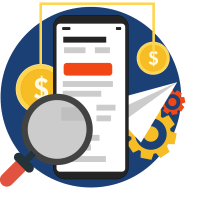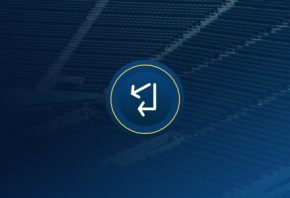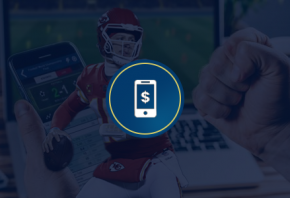If you’ve ever placed a sports bet, you’ve probably wondered how the odds and lines are determined at casinos and online sportsbooks. You might have scratched your head trying to work out why the Tennessee Titans were favored by 7 points over the Buffalo Bills even when the game was played in Buffalo, or why the underdog can sometimes seem undervalued in NBA or college football matchups.
At MyTopSportsbooks, we’re here to explain how odds and betting lines are created. From point spreads to totals and prop bets, sportsbooks rely on data, analytics, and market behavior to set their numbers. This article breaks down the process so you can better understand how odds work—and how to identify value when placing your next wager.
The Odds: a Modern-Day Creation
In the past, odds and lines were often set manually by experienced bookies and oddsmakers using their personal judgment and industry knowledge. In 2025, the process is far more advanced. The rise of online sportsbooks has transformed how odds are created, making the process faster, more precise, and heavily data-driven. Most modern sportsbooks now rely on software, machine learning, artificial intelligence and teams of analysts to set betting lines, replacing the traditional, intuition-based approach with one rooted in statistics and modeling.

Remember The Aim of the Oddsmakers
A sportsbook looks to achieve equal action on both sides of a bet; that has been the goal since bookies and sportsbooks began taking bets from sports bettors. Looking at one basic math equation – you can calculate the implied probability of an event happening – like our NFL example above. When betting lines are designed, they don’t reflect the accuracy of the probability of an outcome. The best bets a sports gambler can make are based on a discrepancy – the actual probability and the implied probability that are in conflict, which is determined by the betting line.
How are Odds Determined?
Ideally, sportsbooks set odds to encourage balanced betting on both sides of a wager. When the bets are evenly distributed, it doesn’t matter who wins—the sportsbook pays the winners, collects from the losers, and earns a profit from the vig (the built-in fee charged on each bet). The primary goal of the oddsmaker when setting the opening line isn’t to predict the exact outcome, but to minimize the sportsbook’s risk and potential exposure to large payouts. While oddsmakers need to understand sports and betting behavior, their most critical role is managing risk.
How Were Odds Set Back In The Day?
Before computers and online sportsbooks, bookies would huddle around chalkboards, thrash out the odds, and take bets via payphones from gamblers. Now, oddsmaking consulting firms handle most of the business. In 2025, they take a data-driven scientific approach based on a mathematical equation to come up with sports odds for any contest.
How do Power Rankings Drive Oddsmaking?
The sportsbook bookie community was a small, close-knit community, and each bookie had their own power rankings based on the criteria they developed over time based on industry experience. The rankings used player performance, schedule, and team performance, balanced against each other in combination with statistics and intangibles to create the odds. Once the rankings were established, the injury report and common sense/logic were blended to generate the first number posted on the tote boards.
Today, in contrast, statistics and data drive the odds.
Who Makes the Odds?
Today, setting odds is a collaborative effort. Teams of mathematicians, statisticians, and data analysts rely on hard data—not instincts or intuition—to shape the betting lines. While understanding the market is still important, modern oddsmaking is driven by numbers, not just knowledge of the game. Thanks to advanced computing power, oddsmakers can now analyze decades of data and spot trends that would have been impossible to identify in the past. And with the rise in AI and machine learning, their ability to predict outcomes is greatly enhanced.
![]()
Do Power Ranking Still Have a Prominent Place in Oddsmaking?
Power rankings still play a key role in setting odds, alongside factors like bettor behavior, risk management, and public reaction to betting lines. With the help of advanced computing, the process has become more data-driven and precise, allowing analysts to incorporate probability and risk more effectively. For major events like NFL games or the Super Bowl, power rankings—often created by consultants or third-party services—are central to how the odds are determined.
The Outsourcing of Oddsmaking
In the 21st century, everybody is an expert, and in the gaming industry, there are people who pore over data daily to set odds and lines for the big and small sportsbooks and casinos. When casinos and sportsbooks employ highly educated analysts, mathematicians and stats people, it becomes a huge cost for the army; the book needs to set the lines and determine the odds. Sportsbooks send the work out to a third party with expertise and background in the gambling industry, and the results are reviewed in-house before the odds are posted.
Some Sportsbooks are Copycats to Save Money
With so many online sportsbooks now in operation, the odds offered across platforms can often look very similar—especially when they rely on third-party providers for odds data. Many sportsbooks monitor competitors and adjust their lines to stay in line with industry norms. They may also fine-tune their odds based on their own customer base and betting history to encourage balanced action.
Consulting Firms
Laying off the high cost of line/oddsmaking to a consulting firm saves money and increases sportsbook profits. Even half a percent can represent millions of dollars for a sportsbook that does a brisk business.
Exotic/Unique Odds
If you are betting on Reality TV, the Oscars, or an election, the odds were created in-house to cover the type of exotic bet not regularly listed at a sportsbook or casino. Oddsmaking software can help set the odds – consulting firms and third-party suppliers of odds for casinos and sportsbooks use the same software.







 Best Offshore Sportsbooks
Best Offshore Sportsbooks 